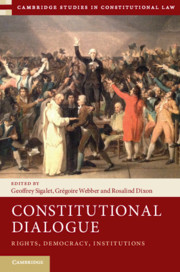Book contents
- Constitutional Dialogue
- Cambridge Studies in Constitutional Law
- Constitutional Dialogue
- Copyright page
- Contents
- Contributors
- Preface and Acknowledgements
- Note on the Cover Image
- 1 Introduction
- Part I Dialogue and Democracy
- Part II Dialogue and Institutions
- Part III Dialogue and Rights
- Part IV Case Studies of Dialogue
- 12 Prisoners’ Voting and Judges’ Powers
- 13 ‘All’s Well That Ends Well?’
- 14 A Feature, Not a Bug
- Part V International and Transnational Dialogues
- Index
12 - Prisoners’ Voting and Judges’ Powers
from Part IV - Case Studies of Dialogue
Published online by Cambridge University Press: 19 April 2019
- Constitutional Dialogue
- Cambridge Studies in Constitutional Law
- Constitutional Dialogue
- Copyright page
- Contents
- Contributors
- Preface and Acknowledgements
- Note on the Cover Image
- 1 Introduction
- Part I Dialogue and Democracy
- Part II Dialogue and Institutions
- Part III Dialogue and Rights
- Part IV Case Studies of Dialogue
- 12 Prisoners’ Voting and Judges’ Powers
- 13 ‘All’s Well That Ends Well?’
- 14 A Feature, Not a Bug
- Part V International and Transnational Dialogues
- Index
Summary
- Type
- Chapter
- Information
- Constitutional DialogueRights, Democracy, Institutions, pp. 337 - 363Publisher: Cambridge University PressPrint publication year: 2019



